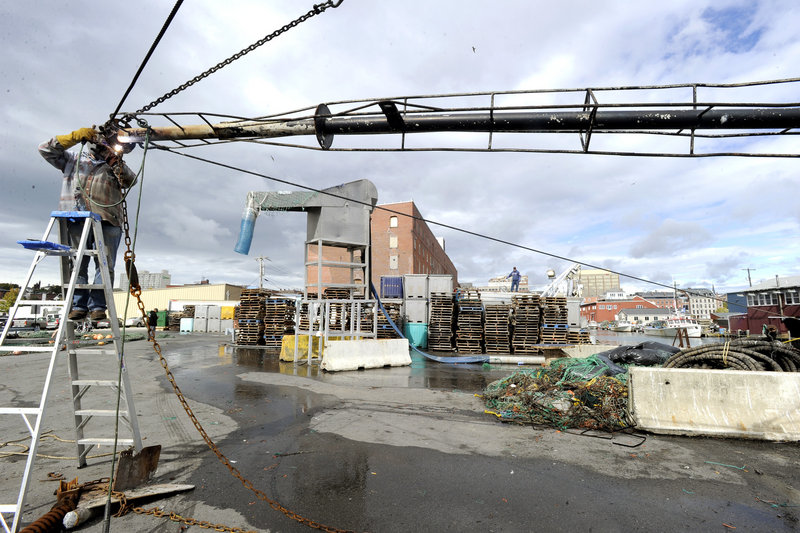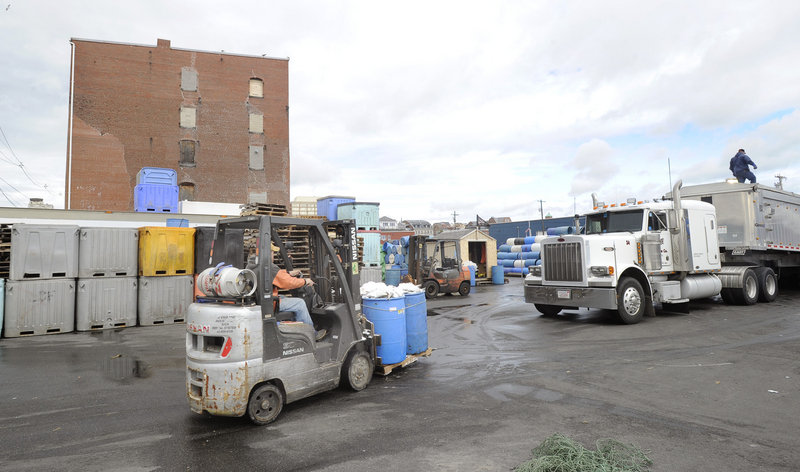PORTLAND – A flurry of e-mails late this spring indicates that city officials were worried that a small bait operation on the Portland Fish Pier could derail a multimillion-dollar waterfront law office project and redevelopment of the Cumberland Cold Storage building.
After a Pierce Atwood partner e-mailed the city on May 30 to complain about the refrigerated trailers and bait containers — saying they “totally transform the site from a potential first-class waterfront rehabilitation project to an industrial wasteland” — city officials quickly determined the trailers blocked emergency access to a small portion of the pier and said they would have to be moved.
The e-mails, obtained by The Portland Press Herald under a Freedom of Information request, make it clear that the city wanted the Dropping Springs Bait operation moved to satisfy Pierce Atwood’s concerns about the aesthetics along a central portion of Portland’s working waterfront after the law firm threatened to pull out of the $12 million project to move into the former warehouse.
City officials contended at the time that public safety concerns prompted the change in location for Dropping Springs Bait, even though the access concerns were first raised by the city’s top economic development official only after the Pierce Atwood complaint. The safety issue, which involved access for emergency vehicles to part of the pier, was resolved by moving one trailer on the site.
The conflict on a waterfront between traditional marine uses, which are often smelly, noisy and unattractive, and upscale office and residential uses has been a subject of debate in Portland for decades.
As the city moves to further relax once-strict marine-only zoning rules on the waterfront, that conflict plays out in the e-mails between Pierce Atwood and city economic development officials.
Dennis Keeler, a law firm partner, told Greg Mitchell, the city’s director of economic development, that the bait operation’s trailers and containers were “a show stopper.”
“They make the entire site seem like a dead-end industrial alley rather than a gateway to the harbor. … I would not be willing to bring any of my clients to this site,” Keeler wrote in his May 30 e-mail. “It is fair to say that unless these trailers and related containers are removed and protections are put in place to ensure that they don’t come back and that this area stays open in the future, Pierce Atwood has no interest in moving to this site.”
The deal was important to the city, which was eager to keep the large law firm and its 175 employees in the city, and the city gave the building’s owner, Waterfront Maine, a $2.8 million tax break to make sure the project went forward.
Mitchell moved quickly, e-mailing Keeler two days later — the first business day after Keeler’s initial complaint — to say that he and other city officials met with the general manager of the Portland Fish Exchange and Jeff Legere, manger of the bait company, and worked out a deal.
“We reached (an) arrangement to relocate all four trailers and associated storage equipment to adjacent property,” Mitchell said. In bold-faced type, he added, “No future trailer placement will be permitted on the property waterside (sic) to the Cumberland Cold Storage site.”
Mitchell apparently had no authority to negotiate a deal or ban trailers on the site. The Fish Pier is owned by the city, but leased to the quasi-municipal Portland Fish Pier Authority. The authority subleases most of the property to the Portland Fish Exchange, which is also quasi-municipal, but operates relatively independently.
The Fish Exchange in April leased the property next to the Cumberland Cold Storage building to Dropping Springs Bait for $40,000 a year.
“It wasn’t clear to Greg what the relationship was between the city and the Fish Exchange and he made representations that were beyond his authority and once that was made clear to him, he stepped out immediately,” Nicole Clegg, the city’s spokeswoman, said. “Whatever Greg was representing was in no way the final outcome.”
That wasn’t clear to Pierce Atwood, however.
In a June 14 e-mail to several city officials from Gloria A. Pinza, Pierce Atwood’s managing partner, she expresses frustration that the city seemed to be backing off of Mitchell’s guarantees.
In a meeting on June 11, “We were told that no assurances could be given about the situation, when in fact assurances had already been given,” she wrote, referring to Mitchell’s June 1 e-mail. “Now, frankly, we feel as though the rug has been pulled from under us.”
But other city officials stepped in, saying that Dropping Springs Bait failed to get a site plan approved through an “innocent mistake” of city planners.
Tom Valleau, a member of the Fish Exchange’s board, said he and other board members never anticipated that the lease to Dropping Springs Bait would cause such a ruckus.
He said the Fish Exchange was happy to find a tenant for the spot and helped Legere, the bait company manager, get a building permit for a small shed that was put up on the site. Then in early June, the city told Legere and Fish Exchange officials that they should have gotten a site permit because the wheels were taken off the trailers, although Valleau said they could be put back on quickly.
Legere said he has no problem moving, although city officials haven’t said that there would be any difficulty getting site plan approval for the location nearest the Cumberland Cold Storage building. His new location will be a couple of hundred feet away, alongside the Fish Exchange building, and he’s waiting for the city to approve a site plan for that spot.
“I want to be accommodating to whoever,” Legere said.
Valleau said the Fish Exchange is happy now, after striking a deal with Pierce Atwood that will bring in $950,000 to the operation over the next 35 years.
The law firm is making the payments in return for the exchange agreeing not to allow development of the area directly in front of the law firm’s windows on the water.
That space will be used only for net stretching, so fishermen can spread out their nets and make repairs.
Keeler said Pierce Atwood wasn’t trying to muscle out a small business in expressing concern to city officials over Dropping Springs Bait.
He said the city had indicated in earlier conversations that the space between the building and the end of the pier was “reserved for net-stretching,” Keeler said.
So when he visited in late May and saw the bait company’s equipment, “it certainly was very troublesome,” he said.
“We were trying to be very considerate,” Keeler said. “We knew that this was somewhat sensitive and did not want to be in a position of trying to change what went on down there and didn’t want to be viewed that way.”
Keeler noted that the firm is allowed on the waterfront under relaxed zoning that was adopted in 2006 and it had considered — and rejected — a proposal to move to the waterfront a few years before that, at a time when the move would have required a zone change.
“We would not try to ignite that fight,” he said. “If we weren’t a permitted use down there, we would never have had this discussion.”
He said the firm’s payment to the Fish Exchange shows Pierce Atwood’s support of the fishing industry by giving the exchange the “economic ability” to keep a portion of the pier open for net-stretching.
Mitchell said he also thinks the situation has been resolved to the satisfaction of everyone involved.
“I understand the challenges of putting mixed uses together wherever they are. There’s always the potential for inherent conflict when you have different uses co-existing,” he said. “In this particular case, I think a balance to everyone’s benefit was struck.”
But Mark Usinger, who is president of A.L. Griffin, a ship chandlery on Hobson’s Wharf, doesn’t agree.
He said city officials portrayed the need to move Dropping Springs Bait as a safety issue and never mentioned Pierce Atwood’s complaints.
“The first word that comes to my mind is ‘liar,’ ” he said. “It’s pretty clear that tremendous pressure was brought on by Pierce Atwood.”
The situation has been repeated in other cases where non-marine businesses have moved in alongside the fishing industry on working waterfront, Usinger said, and he worries that the conflicts will only grow if the city further relaxes waterfront zoning rules.
“To me, this is what the whole waterfront debate has been about from the beginning,” he said. “We work weird hours. We work 365 days a year. We make noise and dirt and dust and it’s what we do. If you try to pretend that we’re going to fit in with a hotel next door, you’re fooling yourself.”
Staff Writer Tom Bell contributed to this article.
Staff Writer Edward D. Murphy can be contacted at 791-6465 or at:
emurphy@pressherald.com
Send questions/comments to the editors.





Success. Please wait for the page to reload. If the page does not reload within 5 seconds, please refresh the page.
Enter your email and password to access comments.
Hi, to comment on stories you must . This profile is in addition to your subscription and website login.
Already have a commenting profile? .
Invalid username/password.
Please check your email to confirm and complete your registration.
Only subscribers are eligible to post comments. Please subscribe or login first for digital access. Here’s why.
Use the form below to reset your password. When you've submitted your account email, we will send an email with a reset code.